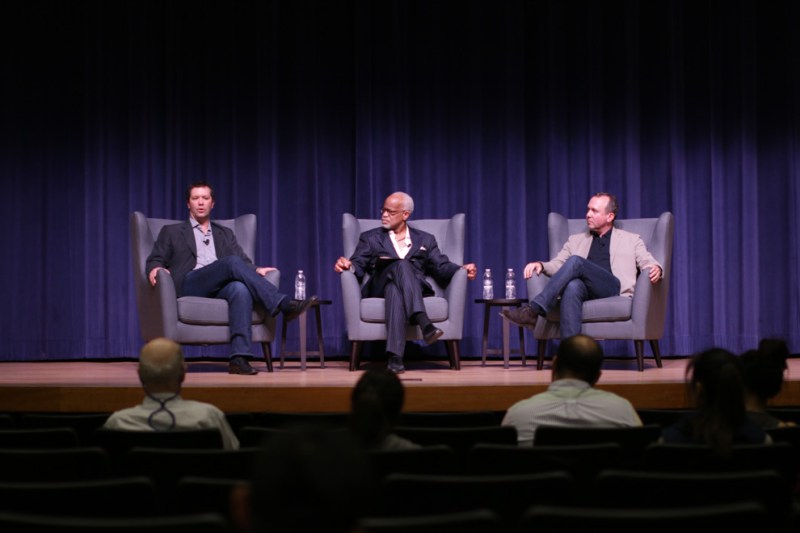Jeff Small ’95, president and co-CEO of Amblin Partners (formerly Dreamworks Studios) and Trevor Macy ’92, founder and CEO of Intrepid Pictures discussed the process of entering the corporate side of film industry in a conversation with students Vice Provost of Undergraduate Education Harry Elam.
The talk, titled Stanford Journeys, advertised that it would cover “alumni perspectives on Stanford and what comes next.” For Small and Macy, that meant sharing their experiences on entering the management and business side of entertainment and providing advice to students interested in the field. Before the talk, 20 upperclassmen were also selected to have dinner with the two speakers.
Although both Small and Macy began their careers when Disney recruited for its finance department on campus, they believe the more traditional and direct way to enter entertainment business is to take on any entry-level job in the industry. For people pursuing a creative route, such as screenwriting, acting or directing, the increased accessibility of digital tools today allows for more flexible opportunities, according to Macy.
“You should move down to LA, and you should get whatever job you can get,” Small said. “It’s not a place where you have to be in your first job for three years. Answering phones or sitting at someone’s desk for six months, do that and meet a lot of people, and you’ll move on to other jobs. And you’ll meet new friends that’ll give you other jobs.”
Macy, who employed around 700 people just last year, interviews many applicants for positions in his company. In order to stand out, prospective employees have to show an exuberant interest in film.
“There’s a level of technical sophistication required, but after we weeded out anyone who didn’t meet that threshold, it’s entirely passion that determines creative fit,” Macy said. “Film entertainment is not easy. The hours are long, sometimes there’s a slog, sometimes there are difficult personalities, and if you don’t love it, it really shows.”
Another resource for students is the alumni network in entertainment. Macy, who interviewed Small for Disney, actually gave Small his first job. Both count many Stanford grads among their current friends in the industry.
“Somehow we gravitated [toward each other],” Small said. “Brian Goldsmith, who is the COO of Lionsgate right now, was a year above me. I knew who he was at Stanford, but we weren’t necessarily friends, and we just kind of found our way toward each other. It helps to [make LA] feel like home.”
Finding a group of people with similar standards, whether Stanford alumni or not, is also a good strategy for managing the flippancy of Hollywood. However, people should not be too dissuaded by the entertainment climate, as similar shallowness will also be found elsewhere, according to Small.
“About the superficiality of LA, it’s certainly there,” Small said. “It’s everywhere. If you get a job in Silicon Valley, it’s going to be there. If you get a job in New York in the banking world, it’s going to be there. Wherever it is, it may just not be as loud as it seems in LA.”
Hollywood’s business face also differs slightly from its creative side. For Small and Macy, working with market data is a large part of the job. For example, Macy’s current projects fall under the horror genre, so he keeps in mind his audience. For horror films, that means 60 percent female moviegoers in the age range of 13 to 29, according to Macy.
“There’s a natural tension between marketing and creativity,” Macy said. “What I mean is, some advertising has to be more overt than a nuanced director might want [it] to be, so it’s my job to navigate those waters.”
With growing expenses for producing and marketing films, companies are also seeking advertising tactics to reach overseas markets. Local film industries in foreign countries such as France and China are gaining popularity, so companies also look for collaborative opportunities.
“It used to be that studios would green-light movies only based on how they’re going to do here in the States, not really thinking about how it’ll play overseas,” Small said. “These days, you can’t really make a movie that doesn’t appeal overseas. You’ll die. You have to be thinking globally when you put together these pictures.”
As seen in the backlash to the recent Oscars, diversity is another concern in film, one which also impacts the corporate side. According to Macy, increasing racial and gender diversity in entertainment not only better represents reality, but is also a sound business strategy, as diverse perspectives produce novel storylines.
“In film entertainment, you’re looking for a relatable story, but you’re also looking for a fresh perspective,” Macy said. “If the same types of people are making the same types of movies over and over again, it’s really not sustainable in the long run.”
Contact Ariel Liu at aliu15 ‘at’ stanford.edu.
